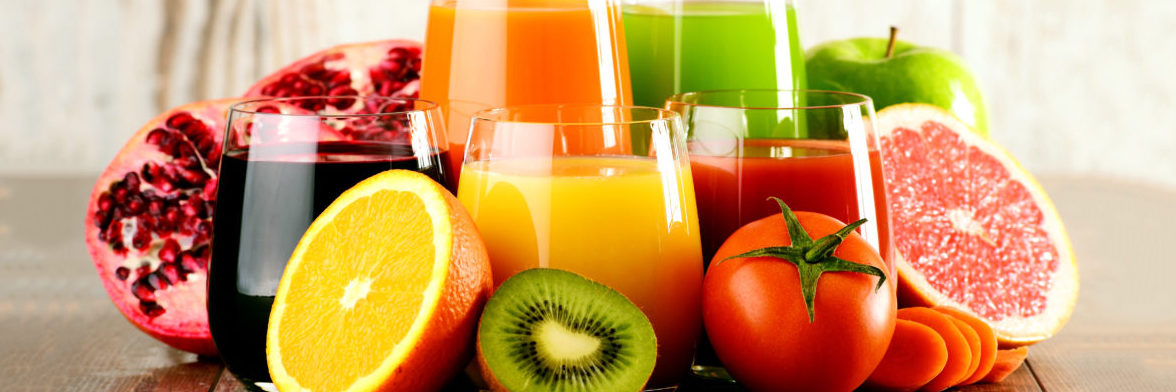
Juice Myths Debunked
Misinformation and confusion have fostered a number of myths about juice. Here science-based research debunks some of the most common misconceptions around 100% juice.
Myth: Juice contains empty calories
Fact: Juice is a healthy, nutrient-dense beverage that delivers significant nutrients to the diets of children and adults. One hundred percent juice is nutritionally similar to the fruit or vegetable it is squeezed from. It delivers key nutrients like vitamin C, vitamin A, potassium, folate and thiamin (vitamin B1), and in fortified juices, calcium and vitamin D, to the diet.1
In addition, 100% juices contain beneficial plant compounds known as bioactives. Fruit bioactives include carotenoids, polyphenols such as flavonoids, and more. Studies show bioactives found in fruit and fruit juice may have the potential to positively impact human health in a number of ways. Some of these benefits include protecting heart health, preserving cognitive function, aiding exercise performance and preventing urinary tract infection.2, 3
Myth: It’s better to avoid juice and just eat whole fruit
Fact: There’s no question that eating fruit is important to overall health, however, fruit consumption remains surprisingly low, with more than 75% of all Americans not getting enough. Increasing fruit intake with whole fruit only, increases dietary fiber, but the combination of one part juice to two parts fruit shows a greater beneficial effect on vitamin C, potassium and calcium than just whole fruit alone. This demonstrates that the combination of fruit and juice has a better nutrient profile than just fruit.5 Research also shows children who drink juice tend to eat more whole fruit overall and have better quality diets than those who don’t drink juice. This suggests juice complements rather than competes with fruit in the diet.6
Myth: Drinking juice is harmful to your health
Fact: Drinking 100% juice does not increase the risk of chronic illness. A 2018 study systematically reviewed the current evidence associated with 100% fruit juice consumption and various chronic health conditions in children and adults. The study as well as others, found no significant associations between juice and weight gain in children or adults and concluded that no adverse health effects were found to be associated with 100% juice consumption related to diabetes, cardiovascular disease, glucose homeostasis, lipid levels, liver enzymes and blood pressure.7, 8
Myth: Juice drinking causes dental caries in children
Fact: Despite recommendations by dental professionals to avoid juice consumption in order to prevent dental caries in young children, there is no scientific evidence that drinking juice in appropriate amounts causes caries more than any other food. A recent 2019 literature search of almost 2,000 studies revealed that only eight publications representing seven different studies on five independent cohorts in children and adolescents included fruit juice and a relevant dental health outcome.9
Of these eight, three studies reported on erosion and juice, and five studies reported on caries and juice. The results: all three erosion-juice studies, representing more than 2,600 children and adolescents found no association between juice and tooth erosion. The other five studies on caries and/or mineralization, representing data from over 1,250 children, (age 2 to 13 y), reported either no association or an inverse association between intakes of 100% fruit juice and the incidence of dental caries.9
REFERENCES
-
USDA Food Composition Databases. US Department of Agriculture. https://ndb.nal.usda.gov/ndb/search/list?home=true. Accessed February 26, 2020.
-
USDA, 2015-2020 Dietary Guidelines for Americans
-
Ho KKHY, Ferruzzi MG, Wightman JD. (2019) Potential health benefits of (poly)phenols derived from fruit and 100% fruit juice. Nutrition Reviews, 78, (2), 145-174.
-
Hyson, Dianne A. (2015). A Review and Critical Analysis of the Scientific Literature Related to 100% Fruit Juice and Human Health. Advances in Nutrition, 6, (1), 37–51. doi: 10.3945/an.114.005728
-
Rehm, C.D., & Drewnowski, A. (2016). Dietary and economic effects of eliminating shortfall in fruit intake on nutrient intakes and diet cost. BMC pediatrics, 16, 83. doi:10.1186/s12887-016-0620-z
-
Nicklas, T., O’Neil, C., & Fulgoni III, V. (2015) Consumption of 100% fruit juice is associated with better nutrient intake and diet quality but not with weight status in children: NHANES 2007-2010. International Journal of Child Health and Nutrition, 4, (2), 112-121.
-
Auerbach B.J. Dibey S., Vallila-Buchman P., Kratz M., Krieger J., (2018) Review of 100% Fruit Juice and Chronic Health Conditions: Implications for Sugar-Sweetened Beverage Policy, Advances in Nutrition, 9(2), 78–85, https://doi.org/10.1093/advances/nmx006
-
Murphy, M. M., Barrett, E. C., Bresnahan, K. A., & Barraj, L. M. (2017). 100 % Fruit juice and measures of glucose control and insulin sensitivity: a systematic review and meta-analysis of randomized controlled trials. Journal of Nutritional Science, 6, e59. doi:10.1017/jns.2017.63
-
Liska, D., et al. (2019). “100% Fruit Juice and Dental Health: A Systematic Review of the Literature.” Frontiers in public health vol. 7 190, doi:10.3389/fpubh.2019.00190


